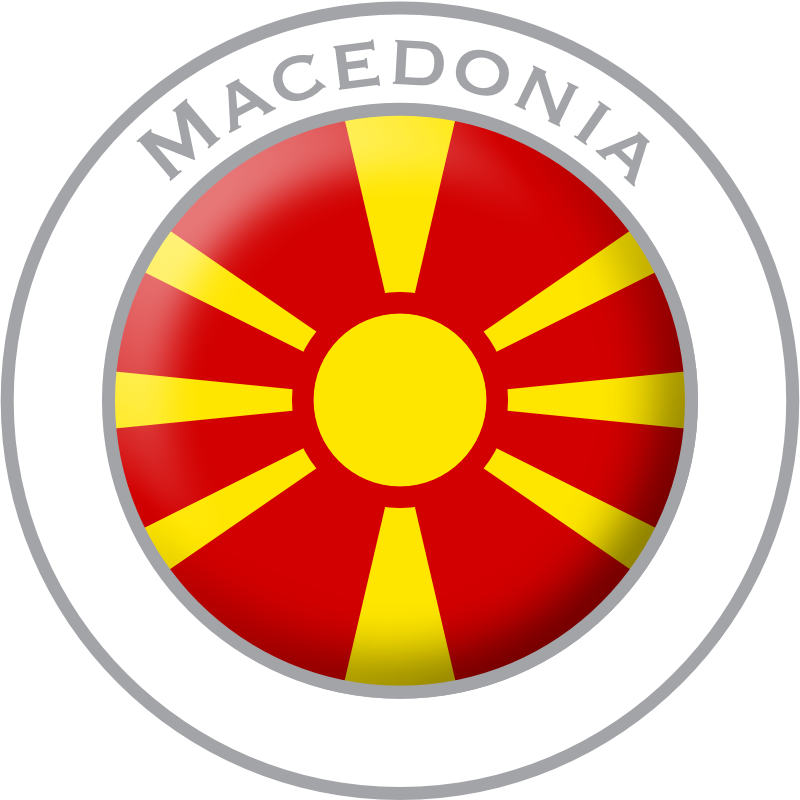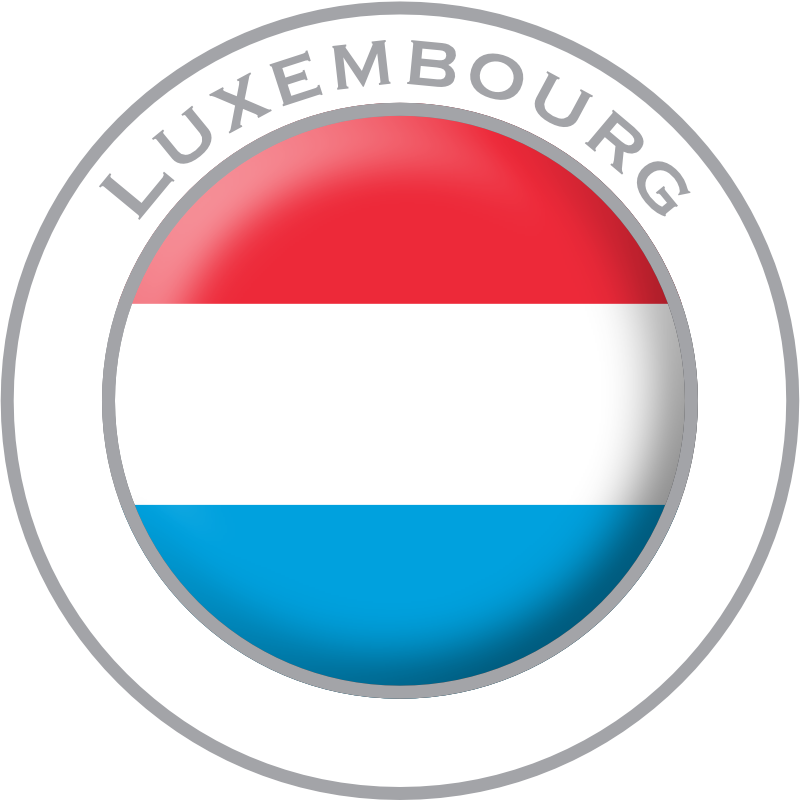Italy
Great Italian Wines
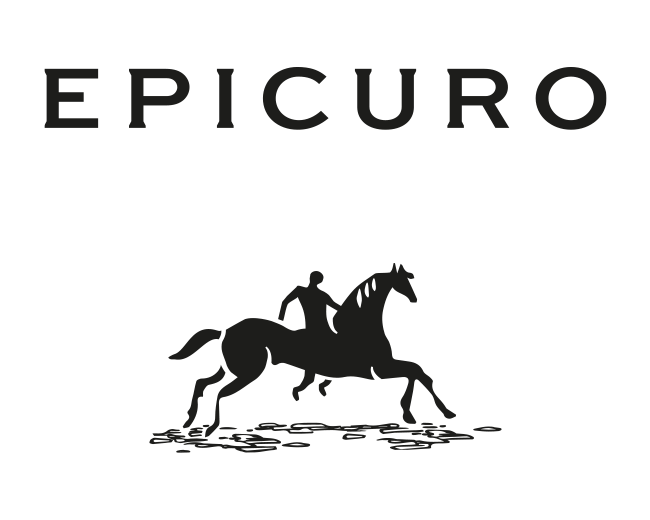
Epicuro (Italië - Puglia)
Epicuro: This series of wines was named after the renowned Greek philosopher "Epicurus". The basis of his philosophy was that in order to live a good life, people should only strive to gain pleasure and avoid pain. Where pleasure only concerns satisfaction of natural desires such as eating and drinking. The best life, according to Epicurus, is a reclusive and modest life among only friends. Pleasure certainly does not have to be a satisfaction of luxurious or exclusive desires. Reason enough for Felicé Merqué to dedicate an assortment of uncomplicated, sunny, lavish and above all delicious wines to this remarkable historical figure. The wines are almost all from the center and south of Italy. Felicé has the exceptional ability to make wines that will make almost every wine lover mouth-watering without requiring exclusive knowledge or pairing them with expensive price tags. An extensive choice of grapes and regions guarantee something for everyone. It is therefore one of our success ranges par excellence!
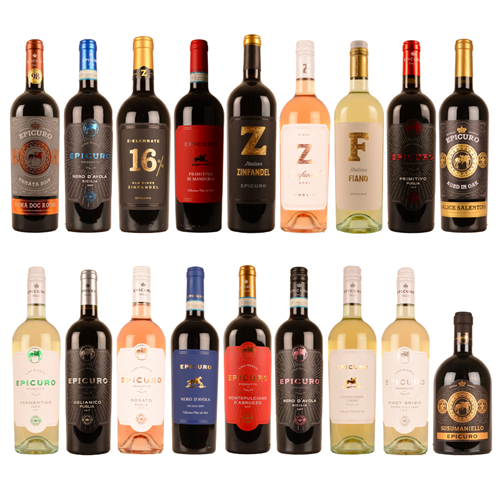
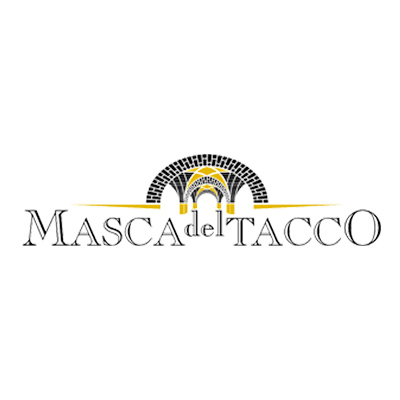
Masca del Tacco (Italy - Puglia)
Erchie was a religious centre where Hercules once reigned, from which it took its name of Hercolanum (or Heracle, Hercle, and later Erchie). This very ancient land of strong traditions, where climate and soil composition give great wines, making them witnesses of the past, present and future of a land where time seems to stand still. In 2010, the Mergè family bought it. Renamed as Masca del Tacco and completely renovated, they brought back the house to the ancient splendour. Into the cellar they introduced advanced devices and innovative production techniques, in order to improve the quality of the wines, without ever changing their traditional character. Its vineyards cover about 250 hectares. The work in the vineyards is done by hand, vinification is traditional, and the use of wooden containers is never invasive, trying to keep the final product as natural as possible.
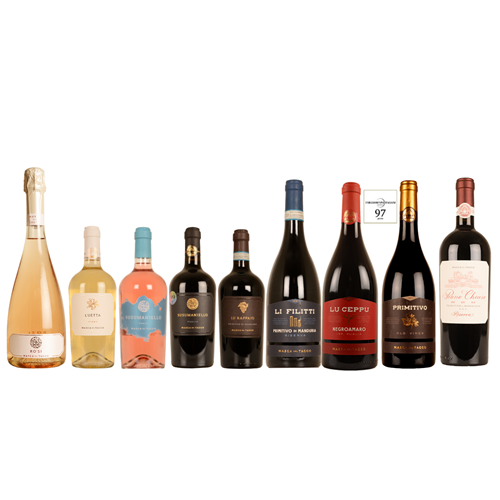
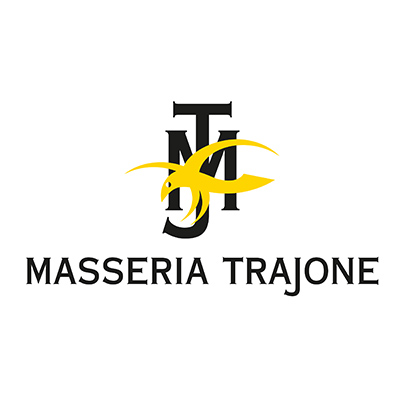
Masseria Trajone (Italy - Grandi Vini d'Italia)
In 1970 Femar Vini was founded. Through a contemporary perspective on wine and with the help of the most modern equipment they succeed to present a wide range of wines from the central and the south of Italy, linking an unlikely good price-quality ratio to authenticity and typicality. Hence, they capture the extensive diversity of the South of Italy in a wide range of sunny delights.
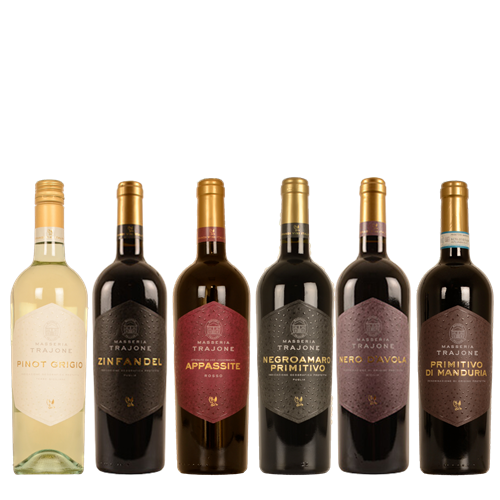
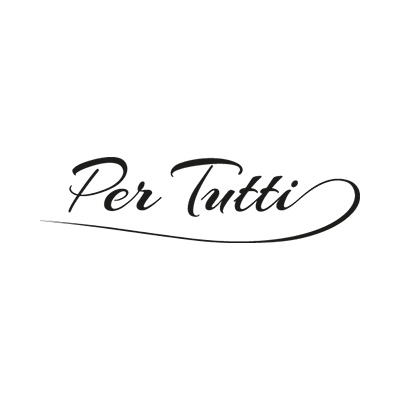
Per Tutti (Italy - Grandi Vini d'Italia)
The project grows traditional italian varieties. It uses the Guyot system and the traditional apulian “alberello” training system to grow its vines. Production is concentrated around well-known wines like Primitivo, Nero d'Avola, Montepulciano, Pinot Grigio and many more to come.
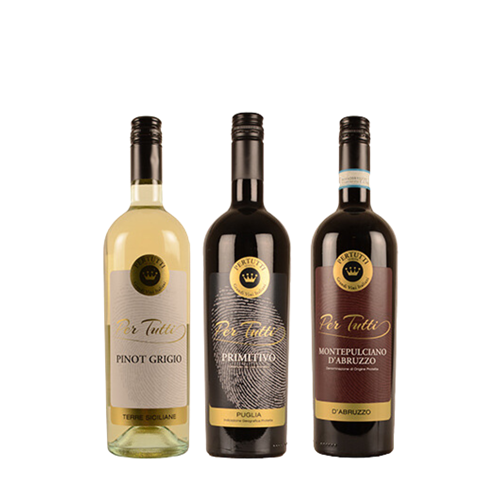
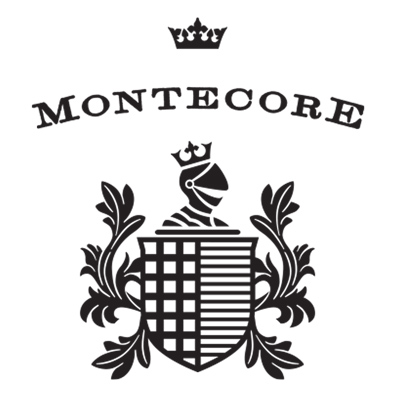
Montecore (Italy - Grandi Vini d'Italia)
Montecore is one of the brands that Felice Mergué, known from Poggio Le Volpi and Masca del Tacco, recently created. With its 2 domains and their wines, Felice is constantly winning awards. He was also voted the best winemaker in the region and with almost all his wines he scores high results of the most renowned critics of Italy. Every wine that comes into his hands is transformed into gold. He makes and creates wines throughout the southern part of Italy. From Frascati to the heel of Puglia, fantastic wines are made that emphasize the high potential of these regions. In addition, he masters the gift of presenting a style that is more than appealing to both the wine lover and the connoisseur. With Montecore he lets Puglia wines once again taste of their great potential here. Mergué is therefore one of the ambasadors of a region that proves that it can do much more than just produce mass and bulk wines.
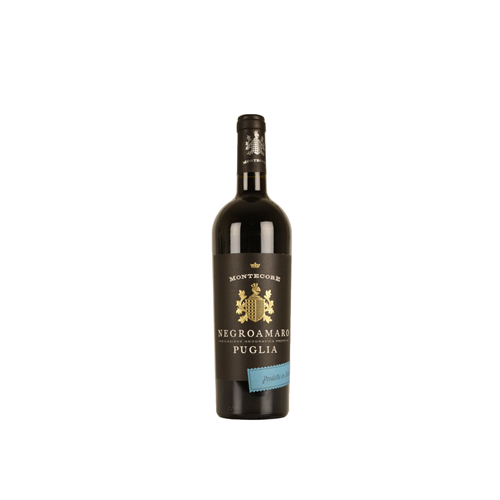
Puglia

Epicuro (Italië - Puglia)
Epicuro: This series of wines was named after the renowned Greek philosopher "Epicurus". The basis of his philosophy was that in order to live a good life, people should only strive to gain pleasure and avoid pain. Where pleasure only concerns satisfaction of natural desires such as eating and drinking. The best life, according to Epicurus, is a reclusive and modest life among only friends. Pleasure certainly does not have to be a satisfaction of luxurious or exclusive desires. Reason enough for Felicé Merqué to dedicate an assortment of uncomplicated, sunny, lavish and above all delicious wines to this remarkable historical figure. The wines are almost all from the center and south of Italy. Felicé has the exceptional ability to make wines that will make almost every wine lover mouth-watering without requiring exclusive knowledge or pairing them with expensive price tags. An extensive choice of grapes and regions guarantee something for everyone. It is therefore one of our success ranges par excellence!


Masca del Tacco (Italy - Puglia)
Erchie was a religious centre where Hercules once reigned, from which it took its name of Hercolanum (or Heracle, Hercle, and later Erchie). This very ancient land of strong traditions, where climate and soil composition give great wines, making them witnesses of the past, present and future of a land where time seems to stand still. In 2010, the Mergè family bought it. Renamed as Masca del Tacco and completely renovated, they brought back the house to the ancient splendour. Into the cellar they introduced advanced devices and innovative production techniques, in order to improve the quality of the wines, without ever changing their traditional character. Its vineyards cover about 250 hectares. The work in the vineyards is done by hand, vinification is traditional, and the use of wooden containers is never invasive, trying to keep the final product as natural as possible.

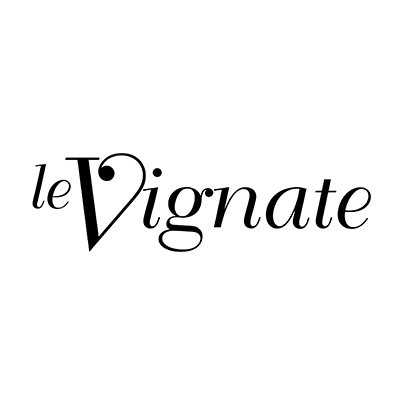
Le Vignate
The grapes for this Primitivo come from vines that are over 50 years old . The vineyards are situated such that the warm summer winds blow through vines and grapes and can dry the grapes , which gives them an intense sweetness .
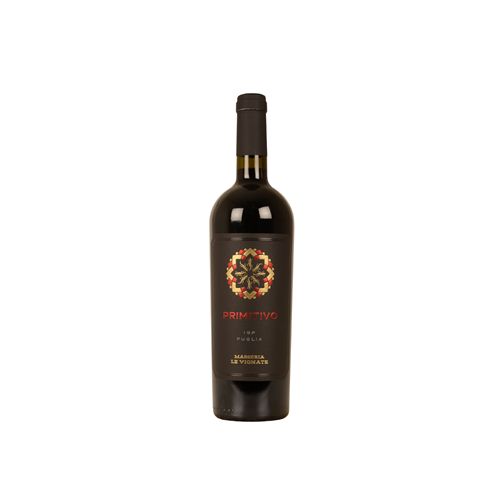
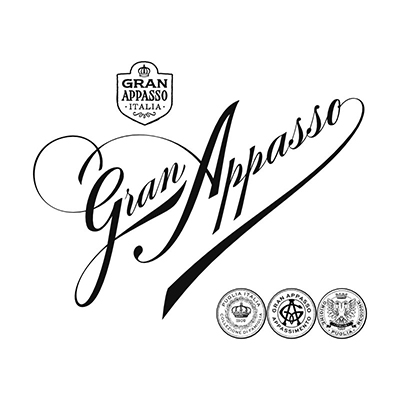
Gran Appasso (Italy - Puglia)
The Gran Appasso range is an assortment of wines made by the insatiable "Master Winemaker" Felice Mergè. He uses an age-old technique that promotes the intensity of the fruit and the sugar and acid content. For the white, red and rosé wines, the grapes are picked in 2 times. With a first "harvest", the bunches of grapes are simply broken and not cut, so that they first ripen for another 2 weeks on the bush, where the grapes are cut off from their juice flow. After 2 weeks, final harvest is made. Originally this was done to guarantee the wines a longer life and a higher quality and to make them more suitable for transport. But even today this technique appears to fit perfectly in the expectations of the modern wine drinker. It ensures optimal taste and drinking pleasure!
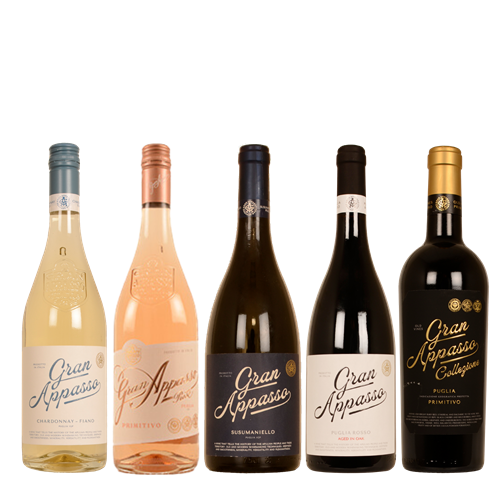
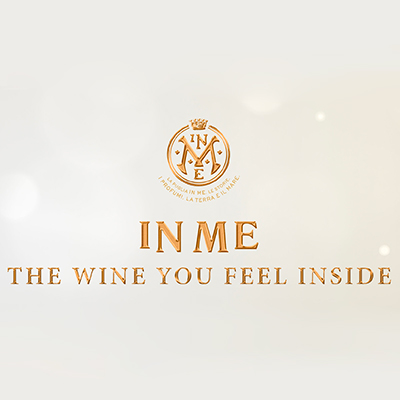
In Me (Italy - Puglia)
After domains such as Poggio Le Volpi and Masca del Tacco and also brands such as Epicuro, Masseria Trajone and Feudi del Duca, Felice Mergé creates a new brand: 'IN ME'. This is a range of wines with the central star being one of Puglia's most cultivated grapes, Negroamaro. Where Negroamaro appears, partner in crime, Primitivo, should not be missing either. As usual, Felicé once again succeeds in serving us an irresistible range of wines. The warm, welcoming character of southern Italy is reflected in every bottle. Generous, opulent wines with a seductive and sunny character that will make both the total layman and the seasoned wine connoisseur fall for themselves. Each and every one of his wines is also awarded with insanely high appreciation figures from wine critics from all over the world. Puglia was once known for its inferior mass wines where quality was completely lost sight of. Nowadays, however, you can make discoveries here that will immediately make every wine lover happy.
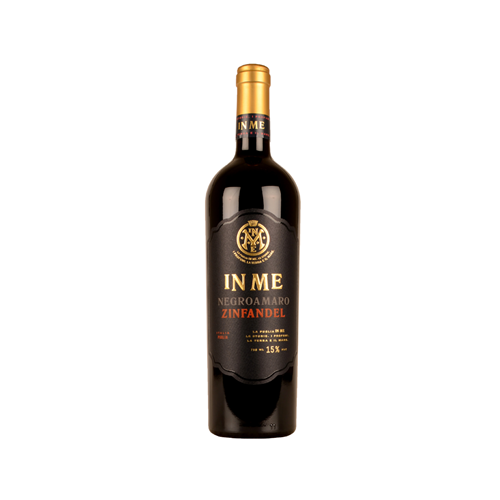

Retroterra (Puglia)
Retroterra is a range of wines created by Félice Mergè, who has spoiled the wine world with a diverse and extensive selection of wines from Rome and Puglia. His wines are gems that captivate and seduce wine lovers from around the world. Retroterra showcases recognizable grapes by their identity and personality, with a distinct accent typical of their terroir and winemaker. Here in Puglia, well-known grapes such as Pinot Grigio, Vermentino, and Pinot Nero are used. There is a strong belief in pure, respectful, and conscientious agriculture. The mineral-rich soil, wind, weather, and years of experience help to present each grape at its best, naturally and without artifice. Retroterra does not aim to simply surprise, but strives to be sustainable and enduring. These wines accompany everyday life, capable of telling a story to the consumer—a story of balance, purity, and receptiveness to what nature has to tell us.
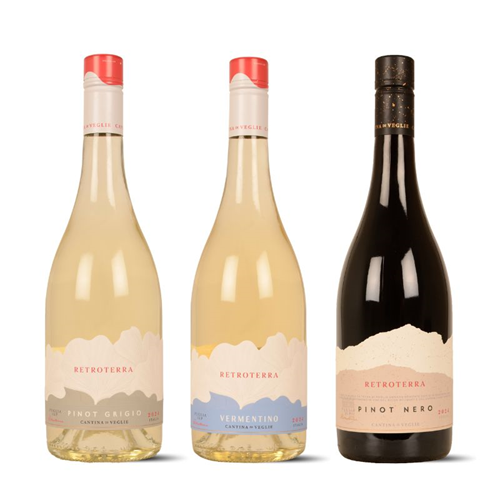
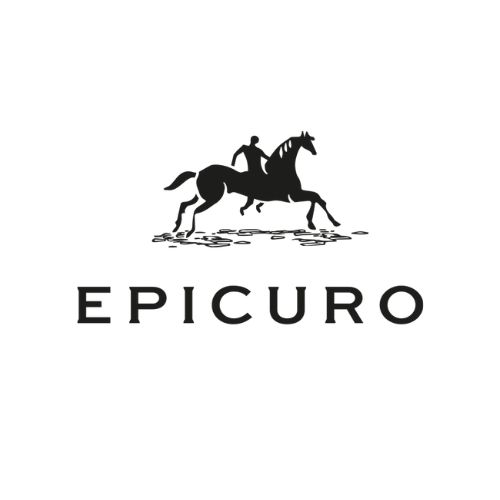
Epicuro Alcohol Free
One of the best wine series in Italy. This delightful range of wines takes its name from the famous Greek philosopher Epicurus. The foundation of his philosophy was that in order to live a good life, people should only strive to obtain pleasure and avoid pain. Where pleasure only concerns the satisfaction of natural desires such as eating and drinking. The best life according to Epicurus is a simple and modest life spent only among friends. Pleasure certainly doesn’t have to be the satisfaction of luxurious or exclusive desires. A good enough reason for Felicé Merqué to dedicate a range of simple, sunny, exuberant, and above all, delicious wines to this remarkable historical figure. The wines come mostly from central and southern Italy. Felicé has the exceptional gift of crafting wines that make the mouth water for almost any wine lover, without the need for exclusive knowledge or expensive price tags. A wide selection of grapes and regions ensures something for everyone. It is, therefore, one of our most successful ranges!
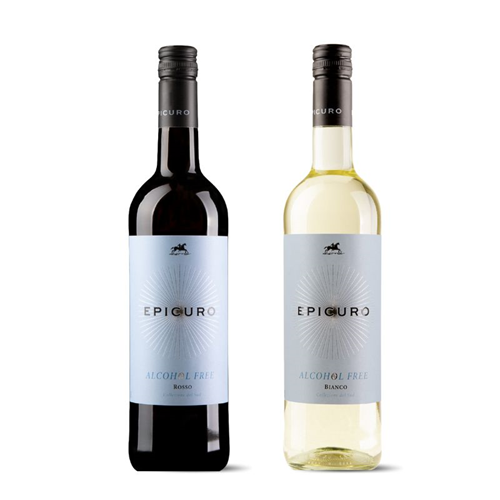
Veneto
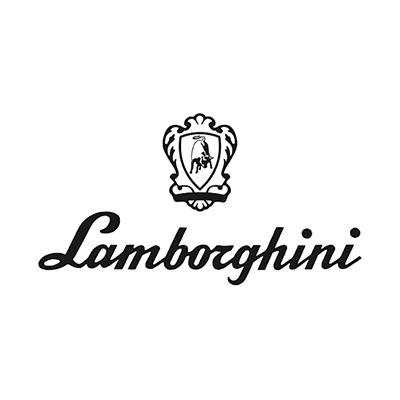
Lamborghini (Italy - Umbria / Veneto)
In the 1960s, Ferruccio Lamborghini, later better known as a world-famous car manufacturer, purchased the beautiful domain, which is situated south of Lake Trasimeno. As he traveled through the region, he fell in love with the beautiful hilly landscape and after his career as a tractor builder and wagon constructor, he decided to return to his roots and devote himself fully to viticulture as the son of farmers. The vineyards are in Umbria but only a few km from Cortona, the most southern appellation of Tuscany. In the 1990s, daughter, Patrizia took over the domain and further strengthened her father's ambition by modernising and enlisting the help of one of Italy's most talented and renowned winemakers, Riccardo Cotarella, nicknamed "The Wizard". He makes top wines from local grapes such as Sangiovese and Montepulciano like no other and mixes them with international grapes such as Cabernet Sauvignon and Merlot. International wine critics such as James Suckling and Robert Parker love it anyway and give these blends absolute top scores in their wine ratings. Another small and fun anecdote that Ferruccio Lamborghini completely draws: When Ferruccio, being a farmer and specialised in building tractors and other agricultural vehicles, but full of admiration for beautiful sports cars like Ferrari, Enzo Ferrari himself pointed out that the bodywork of his cars was not calculated on the power of his engines, Enzo Ferrari replied that he might have known how to drive a tractor but missed any knowledge of sports cars! ... The rest is history!
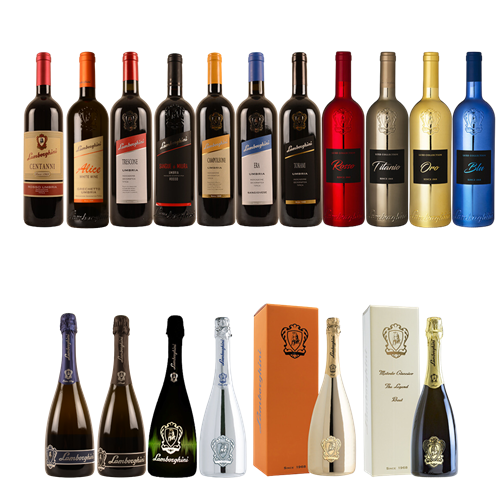
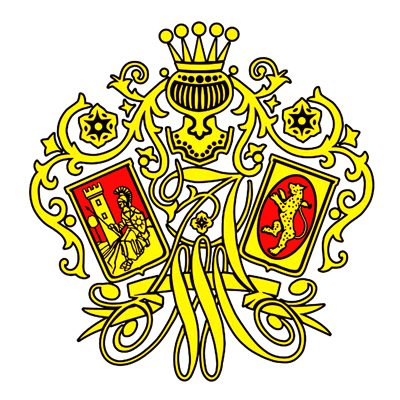
Cornaro (Italy - Prosecco / Veneto)
In the heart of the province of Treviso, at the foot of the hills of Asolo and Montello, in the area of Prosecco, Cantina Montelliana established a cooperative of growers. They use traditional methods and modern equipment, and produce the highest available technologies and with the utmost care. They are also using more traditional methods, which are reliable, and experiences that are closely connected with the history and culture of this area. With an attentive look at the past and through the use of the best winemaking technologies that the market offers Cantina Montelliana processes carefully and supervises the land and the vines with a respectful approach, so excellent wine is obtained. The wine is produced with selected grapes that are chosen because of their high quality. The grapes in the vineyards of this particular country grow between the hills and the plains, which have unique and unrivalled organoleptic characteristics, thanks to the favourable balance between the climate and the soil in this area. The vineyards of Cantina Montelliana are located on the hills of Montello and Asolo on either side of the river Piave: more than 600 hectares of vineyards, characterized by particular soil and climate, ideal for growing high quality grapes.
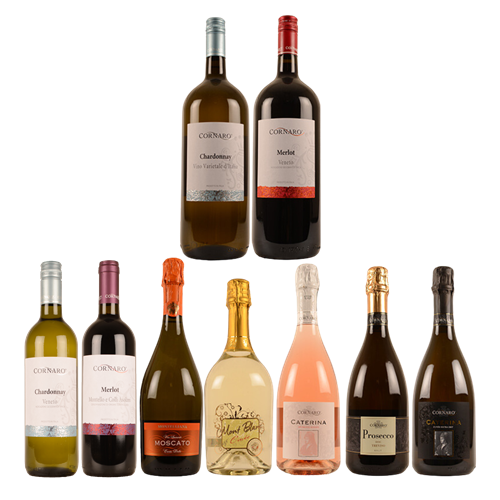
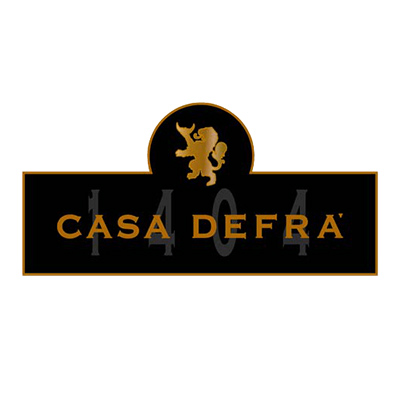
Casa Defrà (Italy - Prosecco / Veneto)
Cielo e Terra was founded in 1908. The Cielo family of vineyards grew from the terroir in the Valle del Chiampo (in the Casa Defrà Estate) and the Cielo family. Giovanni Cielo was the first to start growing grapes there. In the 1930s, the business was continued by one of Giovanni's sons, Pietro Cielo, the only family member who stayed in Montorso. His strong bond with the region and the terroir ensured that he continued the family tradition. In 1962 the third generation came to the helm. Three of the 8 sons of the second generation continue the business. It is now the fourth generation's turn, consisting of Luca and Pierpaolo Cielo who have taken over the business. Since their arrival, Cielo e Terra has been one of the leaders of large-scale trade in Italy. The Cielo family continues to innovate and increase in quality.
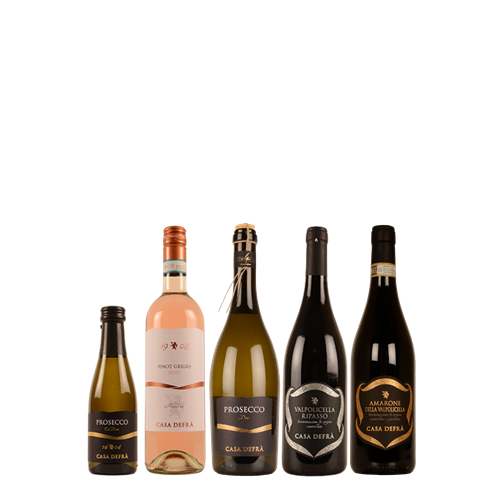

Casa Al Pruno (Italy - Veneto)
Located in Veneto with a maritime climate strongly influenced by Lake Garda and the Dolomites beyond and the Adriatic Sea in the east. Dry, warm summers and mild winters with regular rainfall provide the ideal climate for viticulture. With grapes such as Corvina, Corvinone, Rondinella and Molinara, they come to the ultimate blends for red wine at Casa al Pruno. Their white Lugana, on the other hand, is 100% Trebbiano and will amaze you time and time again.
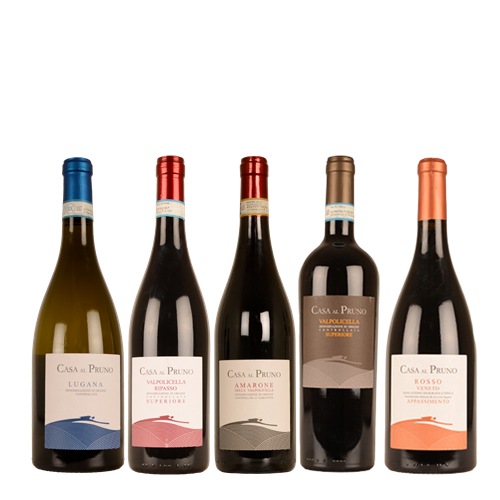
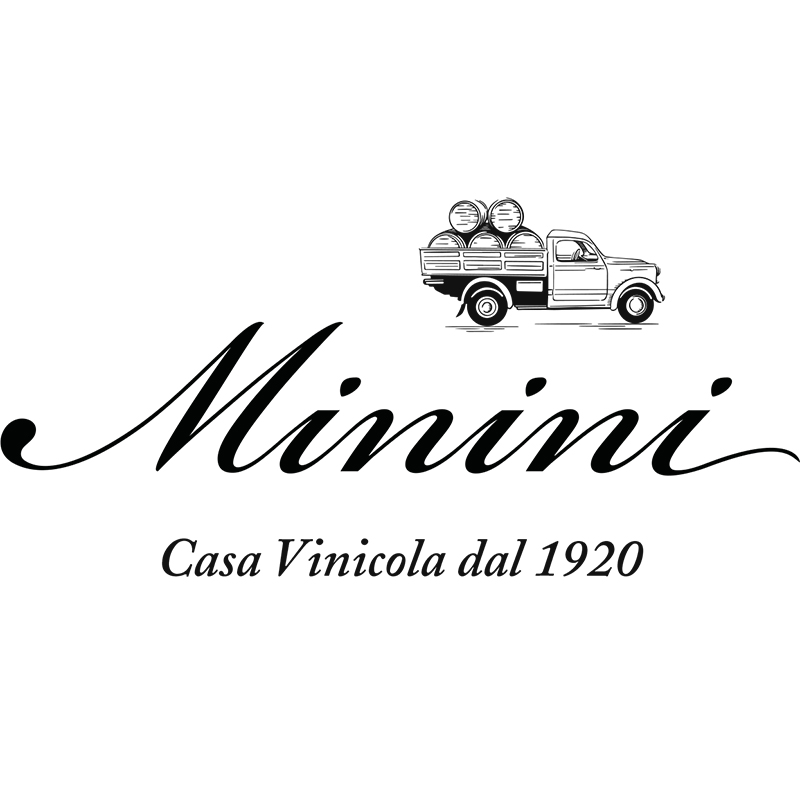
Cantine Minini (Italy - Veneto / Abruzzo)
Cantine Minini was founded in 1920 in Verolanuova, where Francesco Minini had just left the First World War as a young soldier. There was little money but the determination was all the greater to start an ambitious wine estate. This ambition was soon crushed when the Second World War broke out not much later. But even after this tragedy, he continued his life project full of good courage and renewed enthusiasm. In the early 1960s, the winery was completely rebuilt at a new location. Today it is still the headquarters of the many other locations it knows today. Those years also saw the greatest boost for the domain and collaborative projects were launched with winegrowers all over the country, representing almost all the main regions of Italy. This enabled the Minini family to offer a portfolio that was and still is representative of almost all of Italy rather than just the Veneto region. The 3rd generation, again represented by a Francesco Minini, gratefully continues to build on this today and offers a wide quality range of Italian wines at an international level. The wines are, without falling into exclusivity, of a high standard and allow us to enjoy a country like Italy without having to dig deep into our pockets.
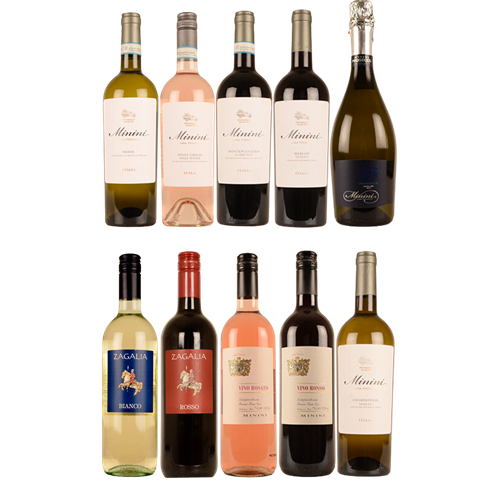
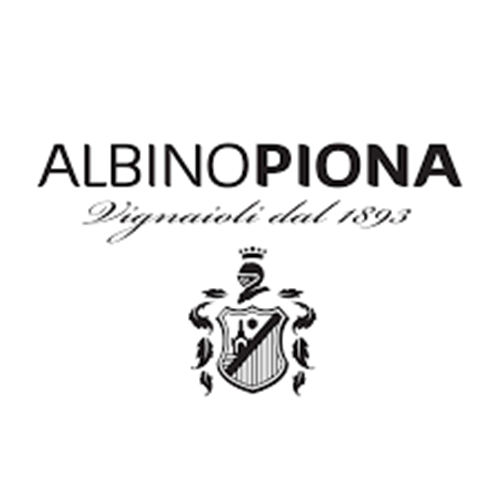
ALBINO PIONA (Veneto)
The wine estate was founded in 1893 and has been producing and selling wine for four generations. The vineyards are located in the hills surrounding the Custoza region and include the appellations Custoza DOC, Chiaretto DOC, and Bardolino DOC. Thanks to its ideal location and climate, viticulture has been practiced here for centuries. A land rich in history, not far from Lake Garda and just a few kilometers from Verona. The two brothers Alessandro and Massimo took over the estate from their father Albino and have been working for years on extensive modernization and the restyling of the wines to meet today's standards and expectations, with great respect for the environment and climate. This has resulted in a style and quality far removed from the often outdated, thin, and rather acidic wines of decades past. The wines combine remarkable richness with meticulous balance and are a delicious enrichment for any wine lover looking to broaden their horizons.
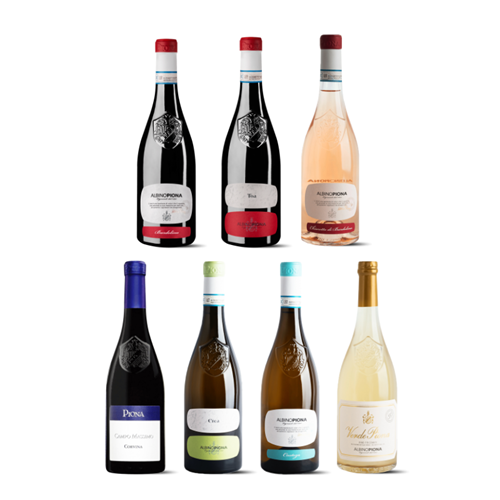
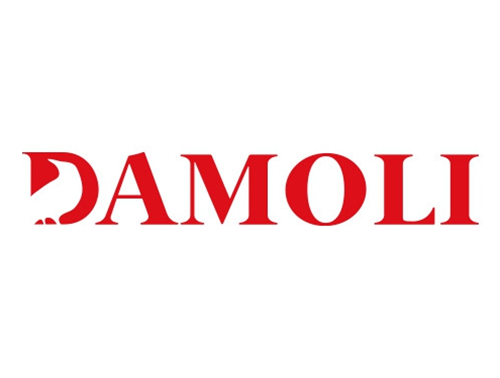
Damoli (Valpolicella)
Bruno Damoli's small estate is located in the heart of the Valpolicella region and is a small family-run vineyard. The family has lived here for many generations, and all of them have been winemakers. Due to its small size and ideal location, quality is the only goal here. Bruno Damoli and his two children run the business. Bruno, with his many years of experience, is invaluable for the general operation and the cultivation of the vineyard. His son, Daniele, is the winemaker. As a child, he already helped out and observed the work his father and grandfather did. Like no one else, he knows exactly what needs to be done to produce top-quality Valpolicella wines. His daughter, Lara, represents the commercial side. With her warm and enthusiastic character, she generously manages the family's public relations. History, innovation, tradition, and quality are the key words. Their philosophy is: "Without forgetting the past, looking forward to the future!" The vineyards are located on rather steep slopes between 200 and 500 meters in a beautiful landscape. Their Amarones, Ripassos, and regular Valpolicellas are among the best in the region.
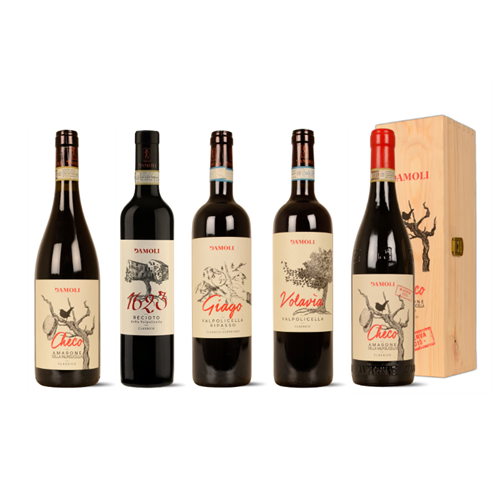
Umbria / Marche
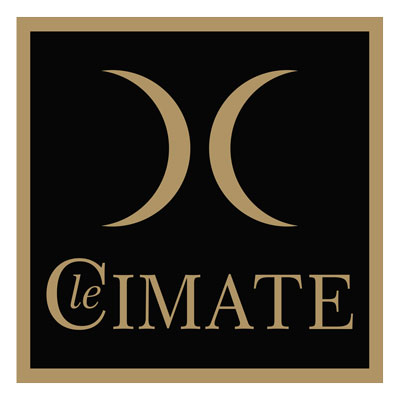
Le Cimate (Italy - Umbria / Marche)
“LE CIMATE” is situated in one of the most suggestive locations at the heart of Umbria - Montefalco. The 28 hectares of land were purchased by the Bartoloni family in 1993 from the Diocese of Spoleto. This site includes the property where the Curate of Casale resided. The family has specialized in agriculture since 1800 and owns a total of 184 hectares of land, of which 108 hectares are used for grain produce, 15 hectares for the hazelnut ,15 hectares for DOP olive groves and 23 hectares cultivate DOCG vines. Situated on a splendid hill top with a 360 degree panorama view of on one side the Monti Martani mountains and on the other side the city of Montefalco, the cantina ‘Le Cimate’, surrounded by it’s suggestive vines, has been constructed on the site of an existing building and takes the name of the actual location. Included in the land is an area where it is said that Saint Clare of the Cross (Santa Chiara della Croce), who lived around the turn of the 12th century, used to shepherd her sheep. In those times there was a water spring that is now long gone where she used to lead her flock to drink whilst she prayed. This area which covers approximately 5 hectares now harvests 4 different types of high quality white grape vines. Three generations of the Bartoloni family have contributed to the construction of the cantina; grandfather Paolo who has dedicated his life to agriculture and moreover has always specialised in vine growing (he was president of the local community cantina ‘Colli Spoletini’ for more than 20 years); his son Giovanni who had the courage to believe in the investment necessary to realise one of the most modern cellar in the area; and grandson Paolo who with his degree in agricultural studies will dedicate the rest of his life to wine production.
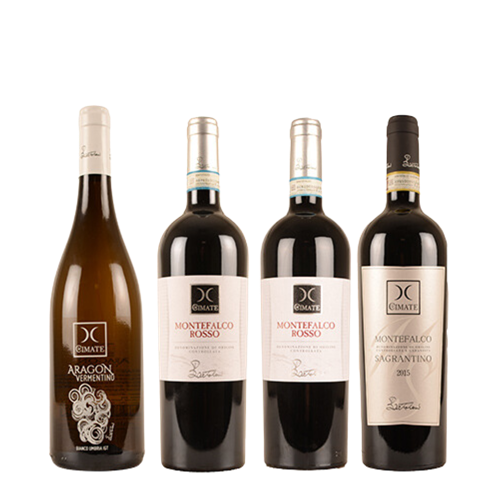

Lamborghini (Italy - Umbria / Veneto)
In the 1960s, Ferruccio Lamborghini, later better known as a world-famous car manufacturer, purchased the beautiful domain, which is situated south of Lake Trasimeno. As he traveled through the region, he fell in love with the beautiful hilly landscape and after his career as a tractor builder and wagon constructor, he decided to return to his roots and devote himself fully to viticulture as the son of farmers. The vineyards are in Umbria but only a few km from Cortona, the most southern appellation of Tuscany. In the 1990s, daughter, Patrizia took over the domain and further strengthened her father's ambition by modernising and enlisting the help of one of Italy's most talented and renowned winemakers, Riccardo Cotarella, nicknamed "The Wizard". He makes top wines from local grapes such as Sangiovese and Montepulciano like no other and mixes them with international grapes such as Cabernet Sauvignon and Merlot. International wine critics such as James Suckling and Robert Parker love it anyway and give these blends absolute top scores in their wine ratings. Another small and fun anecdote that Ferruccio Lamborghini completely draws: When Ferruccio, being a farmer and specialised in building tractors and other agricultural vehicles, but full of admiration for beautiful sports cars like Ferrari, Enzo Ferrari himself pointed out that the bodywork of his cars was not calculated on the power of his engines, Enzo Ferrari replied that he might have known how to drive a tractor but missed any knowledge of sports cars! ... The rest is history!

Lazio
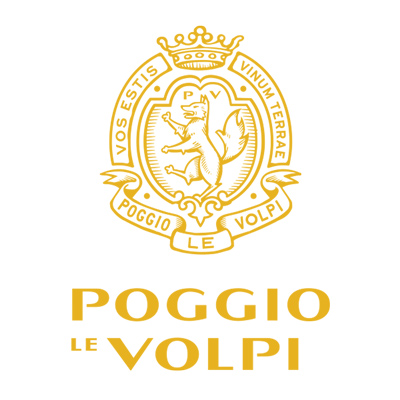
Poggio Le Volpi (Lazio)
Poggio Le Volpi has been a leader in the field of top wine in the Lazio region for a long time and was recently named winery of the year. For both white and red wine for they belong to the absolute top. Already some 100 years, the Merge family owns the domain. Currently Felice Merge, the oenologist is idolized in the region. Their red wine, Baccarossa, is made from the rare nero buono grape and is, according to the Italian wine critic Luca Maroni, the best wine ever made in Lazio He passed his life and work experiences on to the large second generation of the family, experiences which have found vigour and reached full meaning through the bold, enterprising spirit of grandson Felice, wholly supported by the solid, active drive of his father Armando. Poggio Le Volpi has an image which is second to none for the quality and elegance of its wines. These wines are the precious jewels which have ennobled the estate's pedigree due to the praise and appreciation heaped upon them in the refined and exclusive niche wines segment.
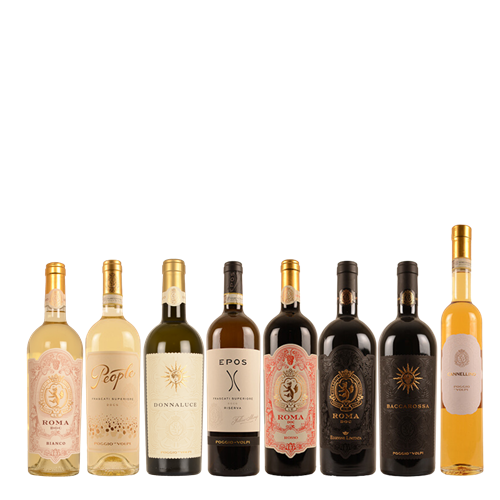
Abruzzo
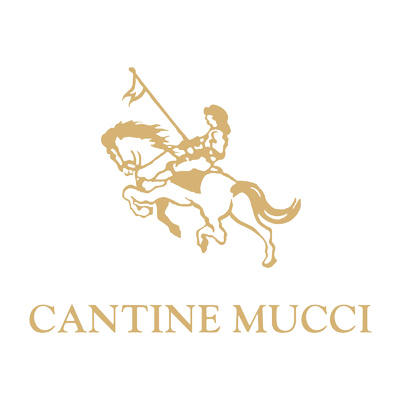
Cantine Mucci (Italy - Abruzzo)
For over 100 years, this family cultivates the better wines of this region. Today, Elisa and Valentino continue this tradition unabated. The rich soils and sunny, reinforced with this young talent, enables us to offer a range of wines full of passion and with an amazing quality.
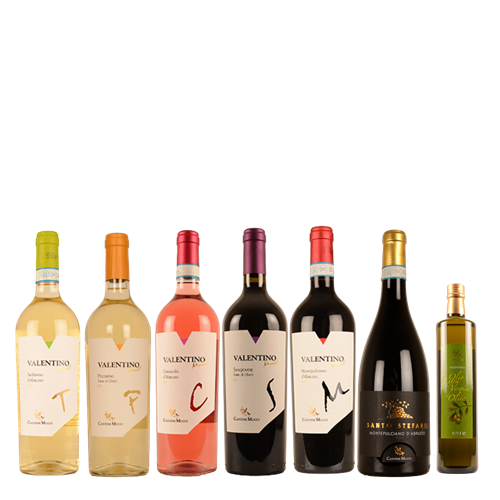

Cantine Minini (Italy - Veneto / Abruzzo)
Cantine Minini was founded in 1920 in Verolanuova, where Francesco Minini had just left the First World War as a young soldier. There was little money but the determination was all the greater to start an ambitious wine estate. This ambition was soon crushed when the Second World War broke out not much later. But even after this tragedy, he continued his life project full of good courage and renewed enthusiasm. In the early 1960s, the winery was completely rebuilt at a new location. Today it is still the headquarters of the many other locations it knows today. Those years also saw the greatest boost for the domain and collaborative projects were launched with winegrowers all over the country, representing almost all the main regions of Italy. This enabled the Minini family to offer a portfolio that was and still is representative of almost all of Italy rather than just the Veneto region. The 3rd generation, again represented by a Francesco Minini, gratefully continues to build on this today and offers a wide quality range of Italian wines at an international level. The wines are, without falling into exclusivity, of a high standard and allow us to enjoy a country like Italy without having to dig deep into our pockets.

Campania
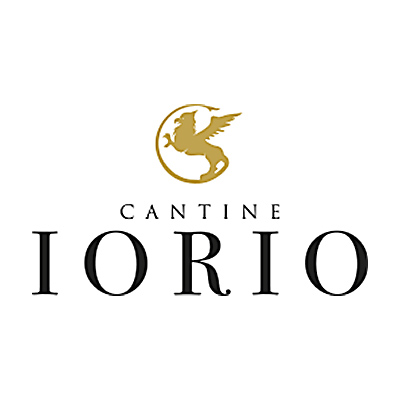
Cantine Iorio (Italy - Campania)
Geological events largely determine the surface landscape of Campania. Extinct volcanoes remain a permanent part of the landscape, and create a "terroir" in which typical grape varieties flourish. This provides its not too rich soil, with a perfect water balance. This works perfect for the grapevines, resulting in its extra minerality and vivacity. For ages people have been active in wine- and olive-growing, pushing its quality standard forward the past decades. Influenced by brothers Pietro and Luca, in 2004 Iorio decided to largely invest in modern techniques, resulting in a tremendous boost for the Azienda. Today, the domain is a wonderful and ultra modern site, decisively producing top brands ! Furthermore, the best Aglianico's equal the best wines from the north, in force as well as shelf life , giving them the nickname "Barolo from the South".
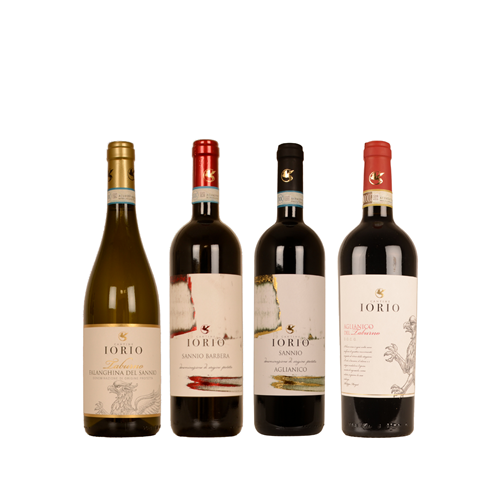
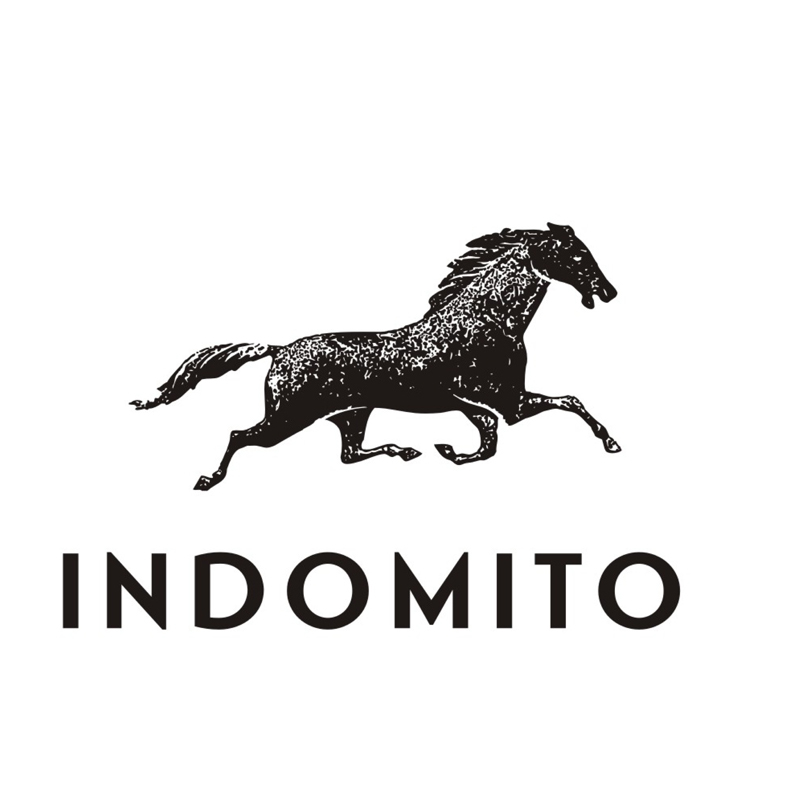
Indomito (Italy - Campania)
Indomito (loosely translated) means rebellious, stubborn, indomitable. These are terms that the wines have been given. Both grape varieties Falanghina (white) and Aglianco (blue) are full of character and come into their own under the name of this winery. With the Mediterranean climate from Beneventano, a sub-region of Campania, there are mainly warm and dry summers and mild winters with limited precipitation.
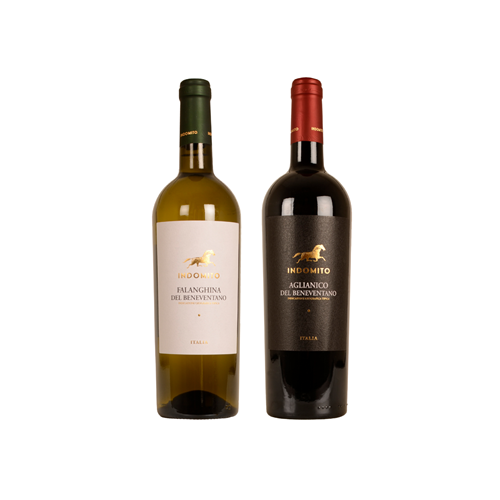
Sicily
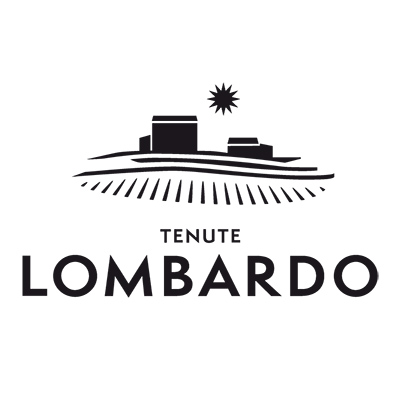
Tenute Lombardo (Sicily)
Lombardo Vini is located in a beautiful hilly landscape (600 m above sea level). It extended over 20 hectares and is almost entirely planted with Nero D'Avola. Nero D'Avola is an indigenous red grape, which is typical for this region. The vineyards are maintained by the Lombardo family with great passion and respect for the environment. The substrate is rich in lime. The typical climate for the central of Sicily is hot and dry, especially during the growing season, and is characterized by little precipitation and high temperatures.
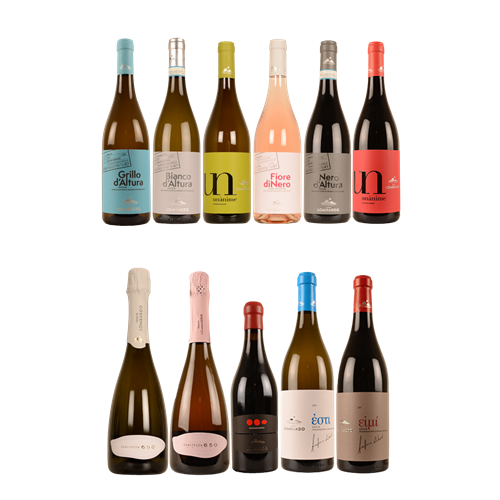

Selezione TANK (Italy - Sicily)
In the early 1960s, the domain was completely rebuilt at a new location. It is still today the headquarters of the many other locations it knows today. Those years also saw the domain's greatest boost and collaboration projects were started with winegrowers all over the country, representing almost all the main regions of Italy. This allowed the Minini family to offer a portfolio that was and still is representative of almost all of Italy rather than just the Veneto region. The 3rd generation, which is again represented by a Francesco Minini, gratefully builds on this today and offers a wide quality range of Italian wines at an international level. The wines are, without falling into exclusivity, of a high level and allow us to enjoy a country like Italy without having to dig deep into our pockets.
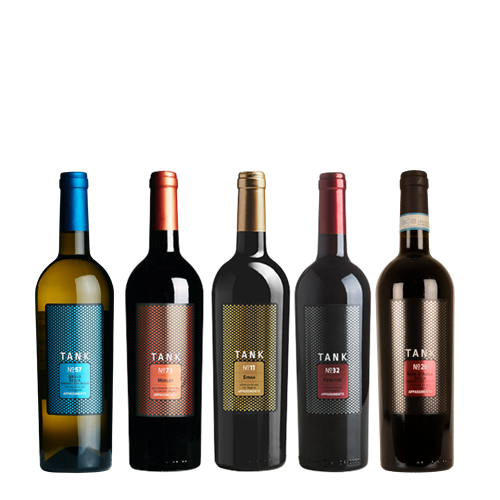
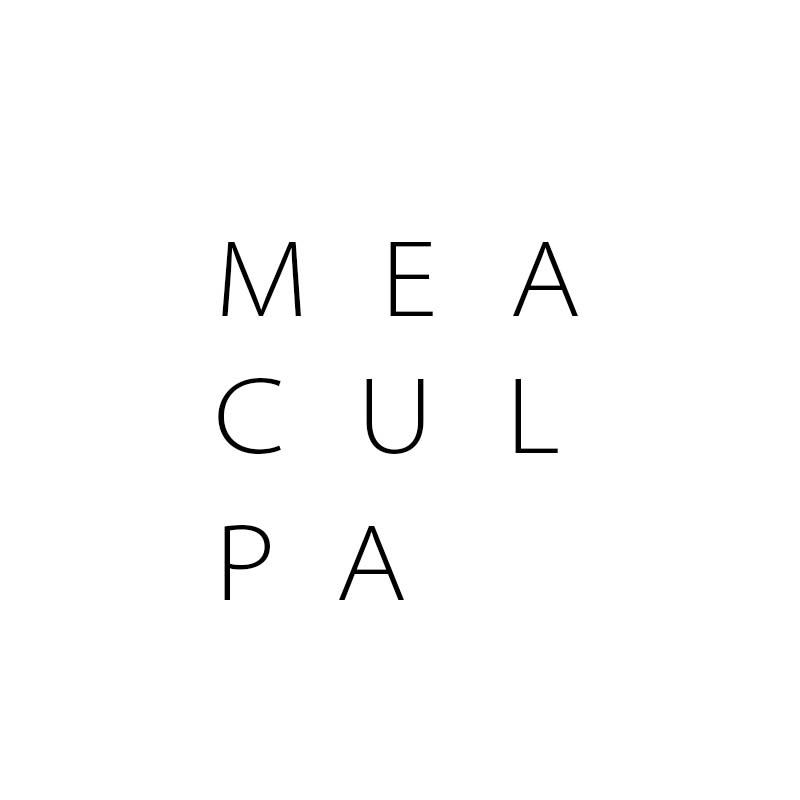
Mea Culpa (Italy - Sicily / Puglia)
Mea Culpa uses grapes from Puglia: Primitivo del Salento, grown from 50 year old vines. The remaining 40% comes from Sicily, Syrah from higher altitude vineyards and a composition of mouth-filling Merlot.
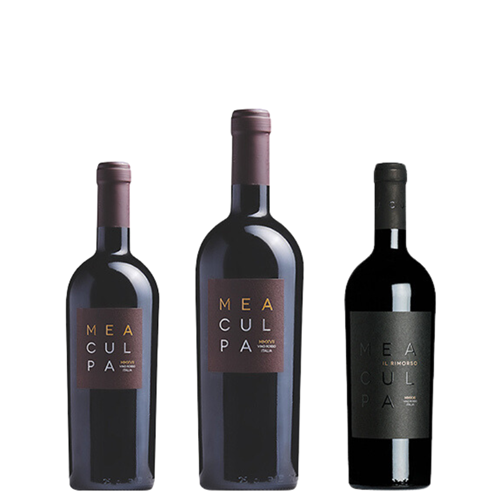
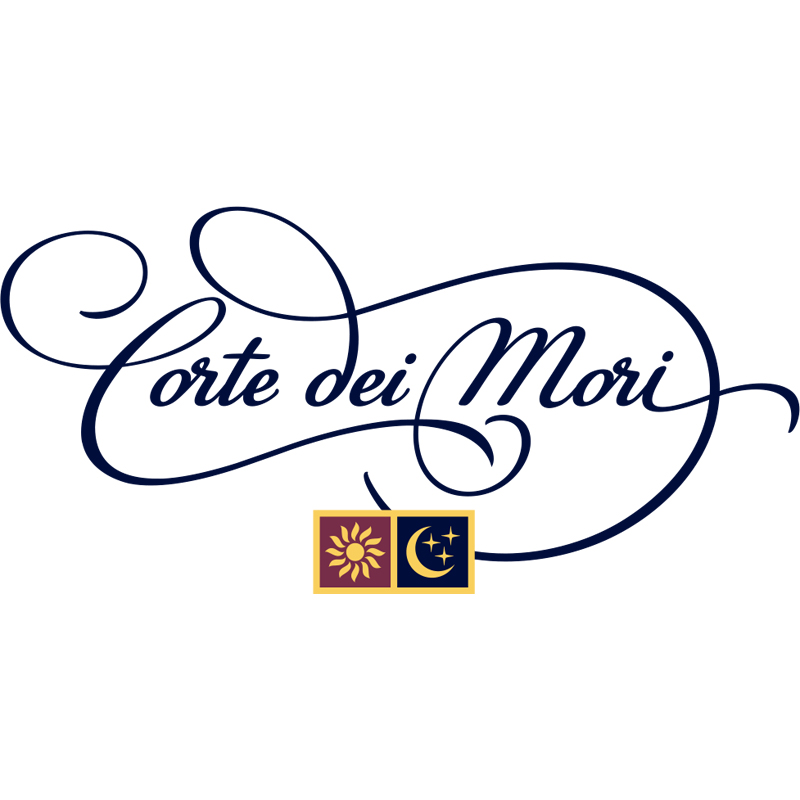
Corte dei Mori (Italy - Sicily)
Cantine Minini was founded in 1920 in Verolanuova where, as a young soldier, Francesco Minini had just left the First World War. There was little money, but the determination was all the greater to start an ambitious wine estate. This ambition soon got a blow when the Second World War broke out not much later. But even after this tragedy, he continued his life project with good courage and renewed enthusiasm. In the early 1960s, the domain was completely rebuilt at a new location. It is still today the headquarters of the many other locations it knows today. Those years also saw the domain's greatest boost and collaboration projects were started with winegrowers all over the country, representing almost all the main regions of Italy. This allowed the Minini family to offer a portfolio that was and still is representative of almost all of Italy rather than just the Veneto region. The 3rd generation, which is again represented by a Francesco Minini, gratefully builds on this today and offers a wide quality range of Italian wines at an international level. The wines are, without falling into exclusivity, of a high level and allow us to enjoy a country like Italy without having to dig deep into our pockets.
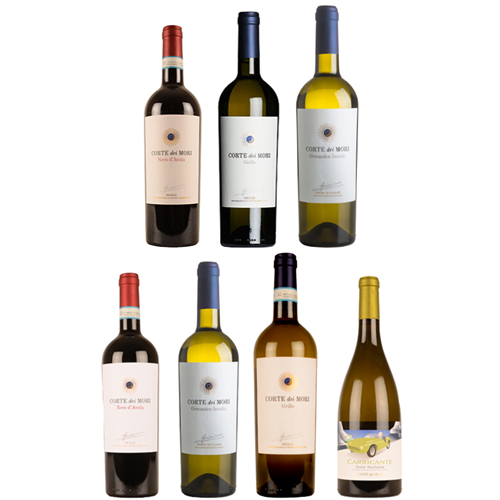
Sardinia

Atha Ruja (Italy - Sardinië)
Atha Ruja is located near the town of Dorgali, located on the central eastern coast of Sardinia. The vineyards are located in the old Oddoene valley and surrounded by mountains: the Supramonte of Gennargentu on one side and Mount Tuluj on the other side. Marco Bernabei was and is an important reference point for Atha Ruja. He is now considered "part of the family" and is a key member for the development, growth, quality and elegance of the wines produced. Peter and Anita reaize this beautiful story with great enthusiasm. Their hope lies in the hands of their children, Manuela, Teresa and Eugenio so that this dream remains reality
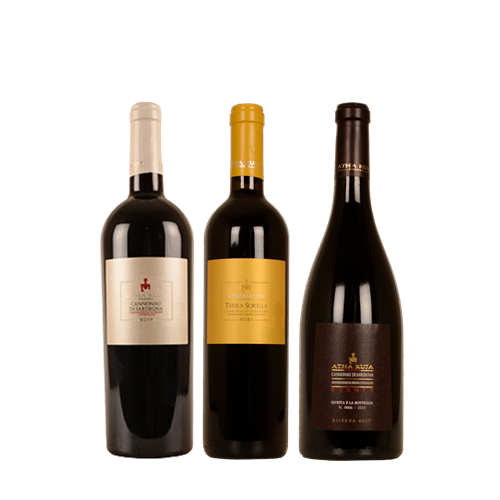
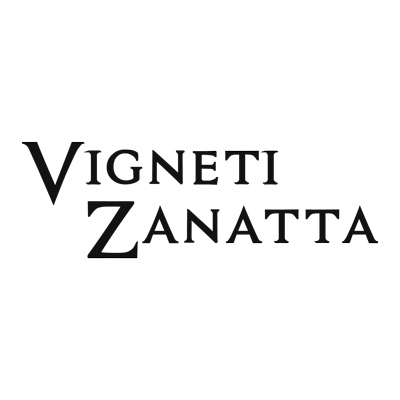
Vigneti Zanatta (Sardinië & Veneto)
Vigneti Zanatta is a young company founded in 2003 with the combination of two pieces of land known for their tradition on the production of the following wines: Sardinia and Veneto. The wines are produced from local grapes in the Gallura area in Sardinia. It is the very nature of the extremely sandysoil with little water or organic matter that gives the wines such as Vermentino di Gallura DOCG and Cannonau di Sardegna DOC their aromatic, spicy flavour by which they are known and can be immediately identified.
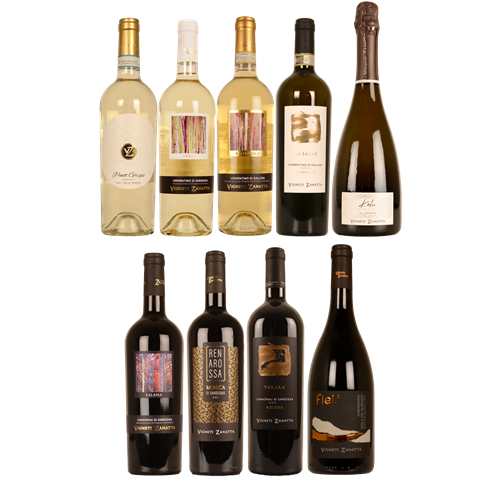
Friuli
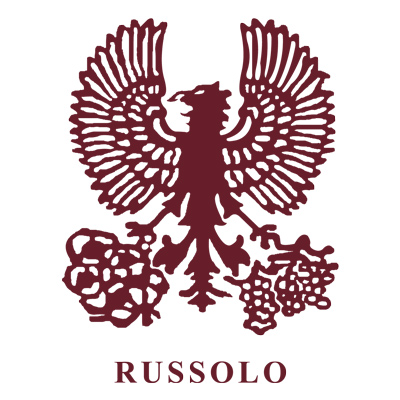
Russolo (Italy - Friuli)
Rino Russolo makes wines on the plain of Friuli near the Veneto , which is called Grave at northeast of Venice . The vineyards are sheltered on the north by the foothills of the Dolomites (Southern Alps) and on the south side by the Adriatic Sea providing sufficient moisture and a fresh sea breeze. The Friuli region in the northeast of Italy, is at the origin of some of the finest white wines in the country. The climate is cool and the air is exceptionally pure due to the further located Alps. In short, the ideal conditions for the production of fine and aromatic quality wines. Here Rino Russolo started his winery in 1925 as one of the first Italians with a degree in oenology. Today, the leadership is in the hands of his grandson Rino Jr. In Russolo they strive for the highest possible quality. The largest part of the grape varieties used is of French origin. The special climate and specific soil results in these typical wines.
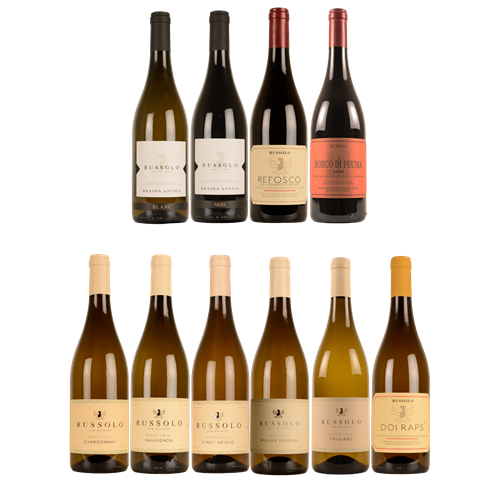
Alto Adige
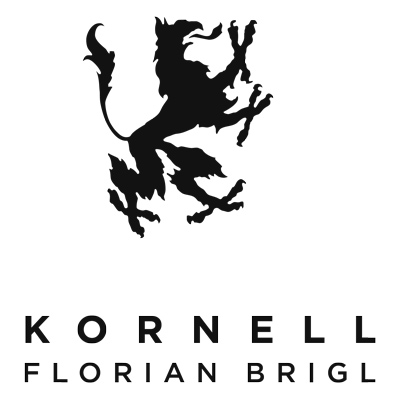
Kornell Florian Brigl (Alto Adige)
The Brigl family has a long history in the wine industry. At a very young age, in 1996, Florian Brigl took over the domain. In 2001 the winery was renovated, and new cellars were built on the domain. Ever since, the delicacies of various grapes such as Lagrein, Pinot Nero, Cabernet Sauvignon, Merlot, Sauvignon blanc, pinot blanc and Gewürztraminer, mature there. Each grape and each cuvée shows pure finesse and balance. The Griffin, printed on each bottle, comes from the banner of the local castle Greifenstein. A Griffin is a mythical animal that is half human/ half eagle. This sense of history, and the deep faith in nature is to be found in every bottle of their wines. The 'Staves' series are the flagship of the domain and belong to the absolute top of Alto Adige. their name comes from the bars which are used to tie the vines to, on the steep slopes of the Dolomites.
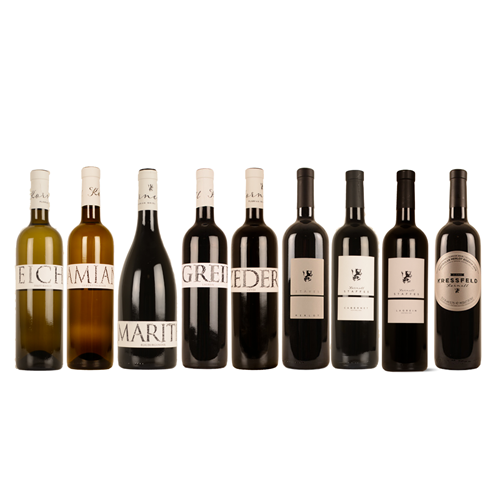
Tuscany
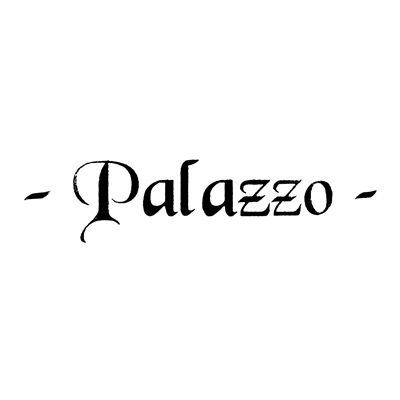
Palazzo (Italy - Tuscany)
Azienda Palazzo. This area produces wine since 1983. The families Loia and Palazzo manage 4 hectares of vineyards with another 3 hectares of olive groves on the eastern slope of Montalcino. Quality is key at Palazzo. With a small production Palazzo guarantees the best quality.
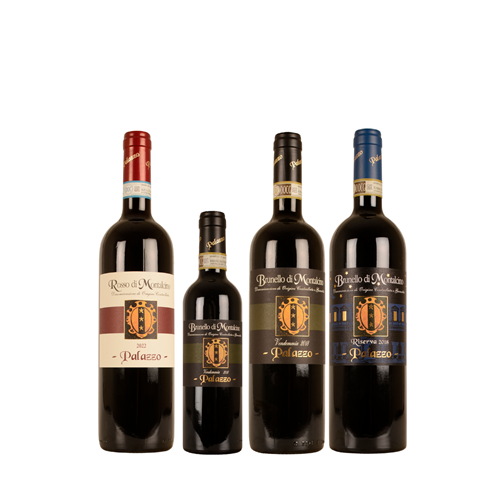
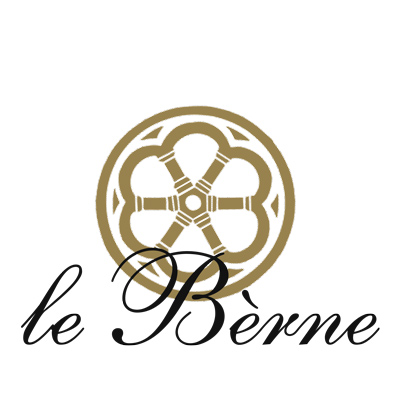
Podere Le Berne (Italy - Tuscany)
Le Berne is a young company with vineyards in Cervognano, the best area for growing Montepulciano. In the 60s Egisto Natalini, decided together with his son Julian to harvest their own vineyards. This was the beginning of a family business that aims at improving the Tuscan wine. An intensive modernization was implemented and through the years, absolute quality was the goal. The production area itself is in Cervognano, which includes the heart of the Vino Nobile wines. It is a hilly piece of land with perfect south-oriented vineyards. The name "Le Berne" comes from the Etruscan "Verna" or "Verena" which means "Surrounded by hills". Here some of the most iconic wines of Tuscany are made!
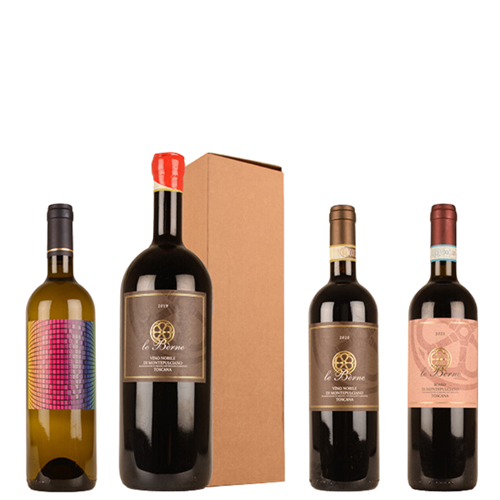
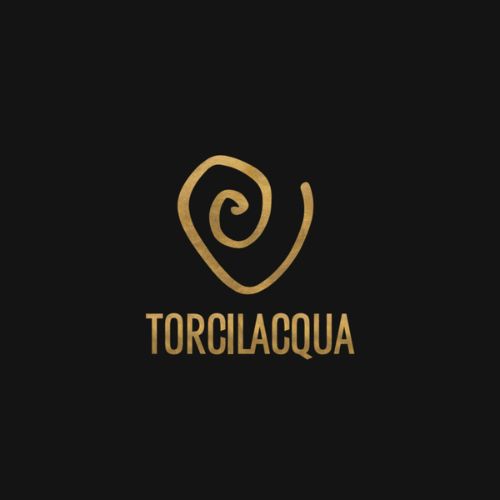
Torcilacqua (Italy - Tuscany)
Matteo Mariotti took over the Torcilacqua company in June 2018 after having worked for many years in the family business. Born in 1979, married and with two daughters, he decided to pursue his dream and produce wine! A passion that was born as a boy and which today has finally materialized in our Torcilacqua wines. The company is located in Badia a Passignano, in the heart of Chianti Classico with a view of the surrounding vineyards and woods. The property extends in a single body on the south, south-west side of the hill, in front of the historic abbey at an average altitude of 350m above sea level. The perfect exposure, the microclimatic conditions of the area and the balanced texture of the soil allow us to obtain grapes of the highest quality for the production of wines with great structure. The vineyards have an average age of 20 years, and the forms of pruning adopted are guyot and spurred cordon. The average plant density per hectare is 5,000 plants. The varieties cultivated at the moment are Sangiovese, Merlot and Cabernet Sauvignon, with which three distinct wines are produced.
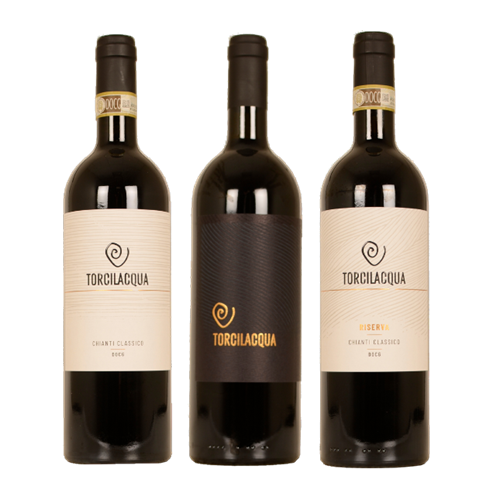
Piemonte
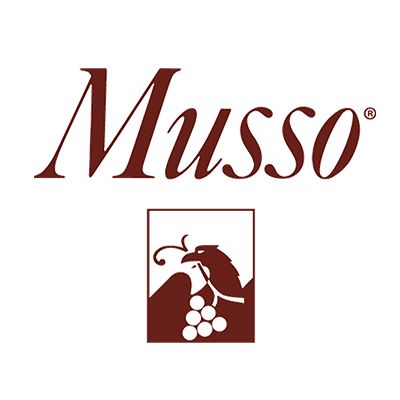
Musso Valter (Barbaresco / Barbera)
With Musso, we welcome the absolute top of Barbaresco to our portfolio. The historic vineyards are also connected to those of their world-famous neighbour Gaja. In 2014, their Barbaresco "Pora" was even voted the best Barbaresco of the year ... scored better than Gaja's! The domain was established in 1929, the year of the great depression in Italy. We could certainly not call it an easy start! But that could not prevent slow but steady work towards the absolute top of the region. At first it started only with 2 tiny vineyards in Cavanna and Ronchi, to which later some of the roaring names of Barbaresco were added. Today, father Valter and son Emanuele Musso run the winery. Despite the enormous status they do with an admirable modesty that at least matches their equally impressive drive. The vineyards of Musso are currently located in 4 of the largest locations in Barbaresco: Pora, Rio Sordo, Ronchi and Cavanna. Every wine and grape is treated with the utmost care and is always an unforgettable experience for every wine passionate. With great pride and respect we would like to introduce and recommend this iconic wine domain to our wine-loving customers.
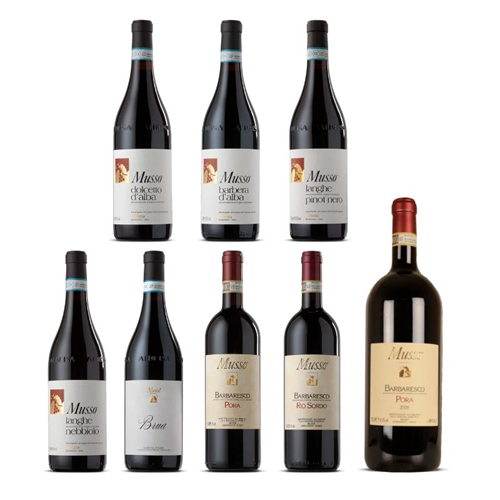

Casina Bric 460 (Italy - Piemonte)
Casina Bric literally translated means: “Farm on the top of the hill”. It is therefore the highest winery of the municipality of Barolo. The average height of the vineyards is 460m (up to 500m), which immediately explains the rest of the name. From the domain you can safely say that you have one of the most beautiful views over the appellation of Barolo. The successive hills with often misty valleys in between are a feast for the eyes and form the ideal habitat for Nebbiolo (Mist), the grape from which the legendary Barolos and Barbarescos are made. Owner and winemaker, Gianluca Viberti, after 20 years tending the family vineyards, started this wonderful project. His view is: "People don't need copies and imitations (there are enough already)". The wines are made here in a traditional way, with a personal approach and with great respect for the ecosystem and climate in general. No chemical yeasts to start the fermentation, new oak maturations that hinder the identity of the wine etc. Here the wine takes its time and Barolos are made as it has been traditionally done with a difficult and demanding grape like Nebbiolo can develop into one of the most impressive, complex and sought after wines in the world. His top wines require many years of patience, but are a great reward for every enthusiastic wine lover once the moment of consumption presents itself.
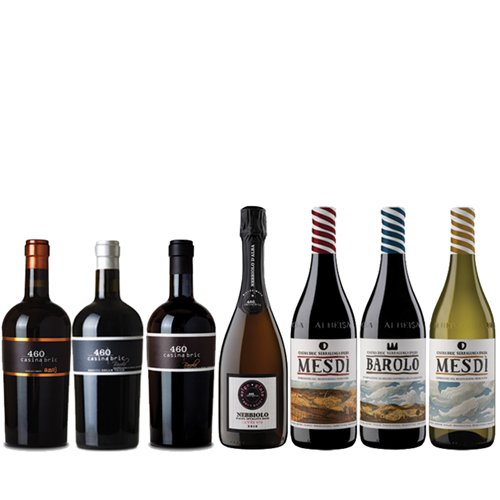

Ciabot (Italy - Piemonte)
A Ciabot in Piedmont means a small shed or cabanne that is often located in the middle of the vineyards to stoke material or get some protection from th weather conditions. Cantine del Ciabot is located in Farigliano and was founded in 1895. It is now the 4th generation of the Fia family that has shared the same passion for more than 100 years with the common goal of allowing dining tables all over the world to enjoy their delicious grape juice. The vineyards extend from the appellations Dogliani to Roero. The white wines are made from Favorita (Piemontese Vermentino), Arneis and Chardonnay. The red wines are represented by the regional trio: Dolcetto, Barbera and Nebbiolo. Their wines are all typical and honest representatives of one of the most renowned wine regions in Italy and an extension of the entire wine world. Don't hesitate to try them out and get a taste of what is arguably the best culinary region in Italy.
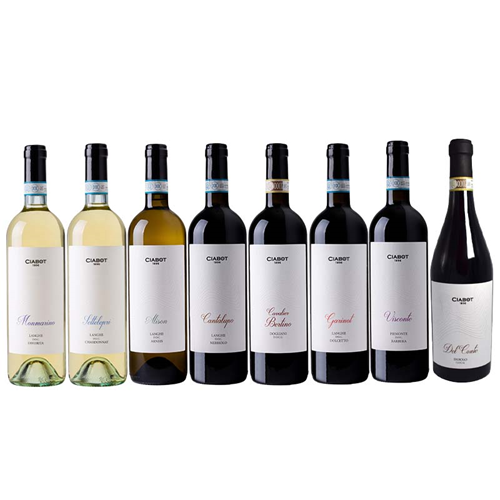
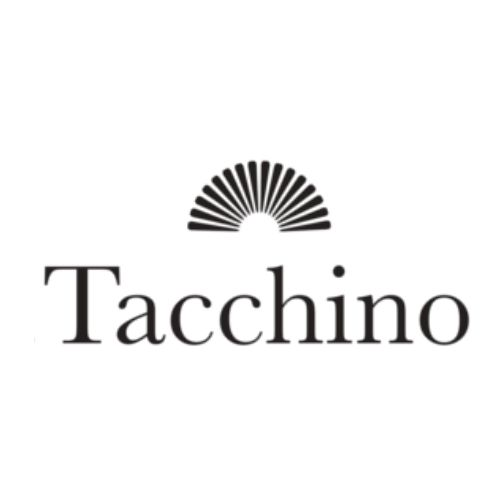
Tacchino Luigi (Piemonte)
Castelletto d'Orba is located west of Gavi. Here the best Barbera's and Dolcetto's that Piedmont has to offer are made. The Tacchino estate is located on the border of the appellations Monferrato and Gavi. Where in Alba (Barolo and Barbaresco) Nebbiolo is the absolute king, here grapes such as Barbera and Dolcetto receive the same royal treatment and especially the best vineyards, which often makes them superior to their namesakes from the region around Alba. For more than 3 generations, the Tacchino family has been producing high-quality wines here. Today, Alessio and Romina manage the estate that they took over from father Luigi. In the prestigious vineyards of Monferrato they make top wines under the appellations of Dolcetto d'Ovada, Barbera del Monferrato and Gavi di Gavi. The 2 most important vineyards form a natural amphitheatre that protects the grape vines from the cold north wind and form a 'climat' in itself. Their loving and expert craftsmanship can be tasted in every bottle of wine that leaves the estate.
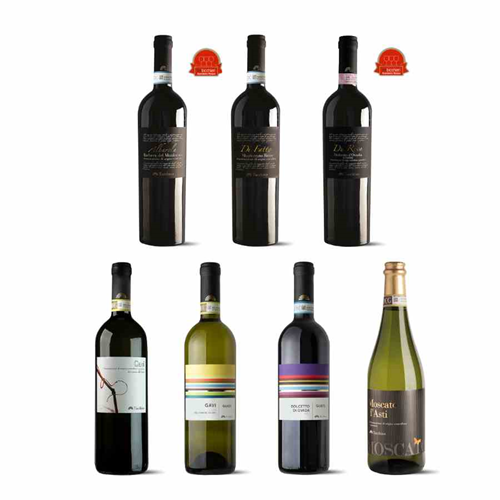
Prosecco
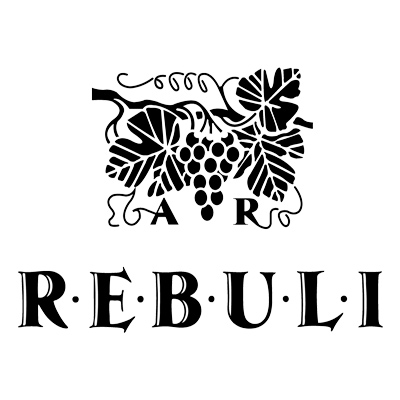
Rebuli (Italy - Prosecco)
Almost 30 years ago, Angelo began producing Prosecco. The close relationship with nature and the constant quest for improvement put this winery on the world map. The three sons, Mauro, Paolo and Giovanni, continue the work of their father with the same passion. The vineyards are located in the small village Saccol the Valdobbiadene near the river Piave. The brand new winery is established with the latest equipment. Real class in Prosecco. Lots of fruit in the nose, round and soft in the mouth and with a perfectly finish

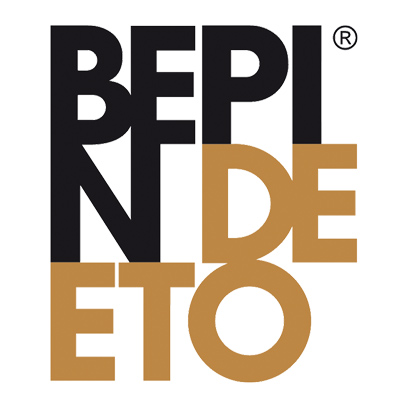
Bepin De Eto (Italy - Prosecco)
This vineyard is located in San Pietro di Feletto at 270 m above sea level. Ettore Cheschin is the man behind Bepin Eto, who develpped more than 40 years ago this vineyard with an eye for tradition and sincerity.
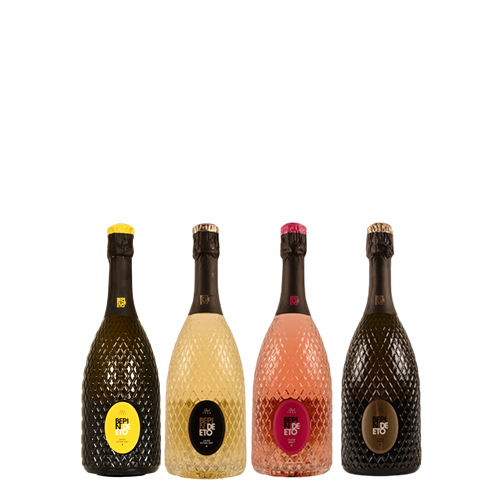

Lamborghini (Italy - Umbria / Veneto)
In the 1960s, Ferruccio Lamborghini, later better known as a world-famous car manufacturer, purchased the beautiful domain, which is situated south of Lake Trasimeno. As he traveled through the region, he fell in love with the beautiful hilly landscape and after his career as a tractor builder and wagon constructor, he decided to return to his roots and devote himself fully to viticulture as the son of farmers. The vineyards are in Umbria but only a few km from Cortona, the most southern appellation of Tuscany. In the 1990s, daughter, Patrizia took over the domain and further strengthened her father's ambition by modernising and enlisting the help of one of Italy's most talented and renowned winemakers, Riccardo Cotarella, nicknamed "The Wizard". He makes top wines from local grapes such as Sangiovese and Montepulciano like no other and mixes them with international grapes such as Cabernet Sauvignon and Merlot. International wine critics such as James Suckling and Robert Parker love it anyway and give these blends absolute top scores in their wine ratings. Another small and fun anecdote that Ferruccio Lamborghini completely draws: When Ferruccio, being a farmer and specialised in building tractors and other agricultural vehicles, but full of admiration for beautiful sports cars like Ferrari, Enzo Ferrari himself pointed out that the bodywork of his cars was not calculated on the power of his engines, Enzo Ferrari replied that he might have known how to drive a tractor but missed any knowledge of sports cars! ... The rest is history!


Cornaro (Italy - Prosecco / Veneto)
In the heart of the province of Treviso, at the foot of the hills of Asolo and Montello, in the area of Prosecco, Cantina Montelliana established a cooperative of growers. They use traditional methods and modern equipment, and produce the highest available technologies and with the utmost care. They are also using more traditional methods, which are reliable, and experiences that are closely connected with the history and culture of this area. With an attentive look at the past and through the use of the best winemaking technologies that the market offers Cantina Montelliana processes carefully and supervises the land and the vines with a respectful approach, so excellent wine is obtained. The wine is produced with selected grapes that are chosen because of their high quality. The grapes in the vineyards of this particular country grow between the hills and the plains, which have unique and unrivalled organoleptic characteristics, thanks to the favourable balance between the climate and the soil in this area. The vineyards of Cantina Montelliana are located on the hills of Montello and Asolo on either side of the river Piave: more than 600 hectares of vineyards, characterized by particular soil and climate, ideal for growing high quality grapes.


Casa Defrà (Italy - Prosecco / Veneto)
Cielo e Terra was founded in 1908. The Cielo family of vineyards grew from the terroir in the Valle del Chiampo (in the Casa Defrà Estate) and the Cielo family. Giovanni Cielo was the first to start growing grapes there. In the 1930s, the business was continued by one of Giovanni's sons, Pietro Cielo, the only family member who stayed in Montorso. His strong bond with the region and the terroir ensured that he continued the family tradition. In 1962 the third generation came to the helm. Three of the 8 sons of the second generation continue the business. It is now the fourth generation's turn, consisting of Luca and Pierpaolo Cielo who have taken over the business. Since their arrival, Cielo e Terra has been one of the leaders of large-scale trade in Italy. The Cielo family continues to innovate and increase in quality.

Lambrusco
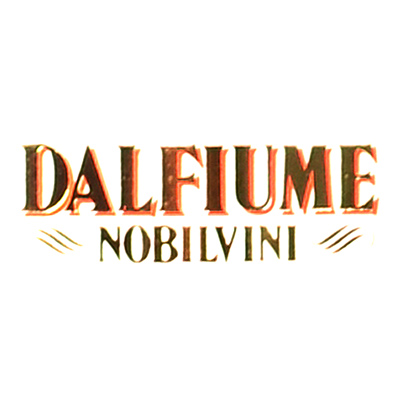
Dalfiume Nobilvini
Dalfiume Nobilvini was founded in 1970 and originated from the merger of the Winehouse Dalfiume Edward (1950) and the Alberici Anacleto Wine Company (1940). Dalfiume Nobilvini was first managed by Edward Dalfiume and later by his sons Franco and Gianni. The grandchildren, Silvia and David have joined the family business. David has become a leader in his field, both by his capacity as a winemaker as by the marketing of Emiliano-Romagnoli wines. There are huge investments made to improve the internal storage of the wines and for the installation of the Vinification department. They also have a modern cooling system to control the temperature during fermentation. In this way, the essential characteristics of different wines can be approved, including flavouring.

Franciacorta
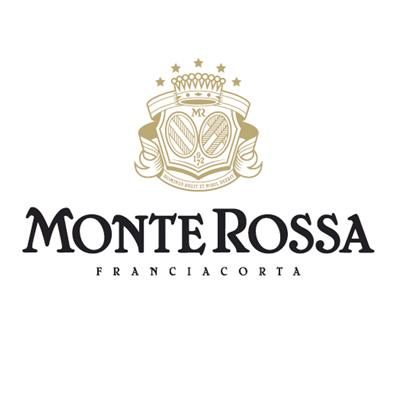
Monte Rossa
Azienda Agricola Monte Rossa, Via L. Marenzio, Bornato, Brescia. Franciacorta is the only DOCG wine in Italy produced with a second fermentation in the bottle. Monterossa was founded in 1972 and owns 50 hectares of vineyards, with 5,000 grapevines per hectare, which are among the best in the region. Heavy investment in the winery has led these wines at the top level. Monterossa now belongs undoubtedly to the elite of the Franciacorta.

Grappa
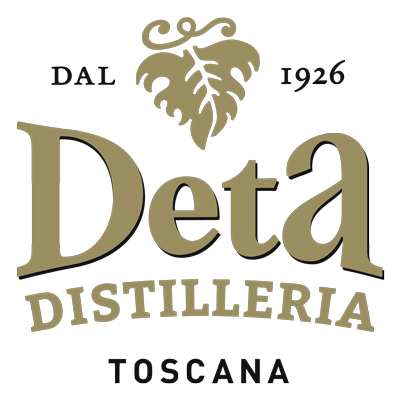
Deta Distilleria
The story of Deta starts in 1926 when the family of Marquis Torrigiani of Santa Christina founded a small distillery near the Chianti hills in the heart of Tuscany between Florence and Siena. After World War II, Angelo Gianchecchi took over the distillery and changed the name to "Lo Stillo". The distillery soon became a reference for distillates in the Tuscan wine landscape. In 1978 the company took its current form. She was taken over by Luigi Forni and his daughter. During the industrial revolution, they implemented drastic modernisations and adjustments and at the same time they could count on Lo Stillo's years of experience and know-how. While other distilleries did not take these steps or did not do so in time, Deta worked its way up to the top of the region. To this day, they present only high-quality distillates that will delight any Grappa or Limoncello enthusiast.
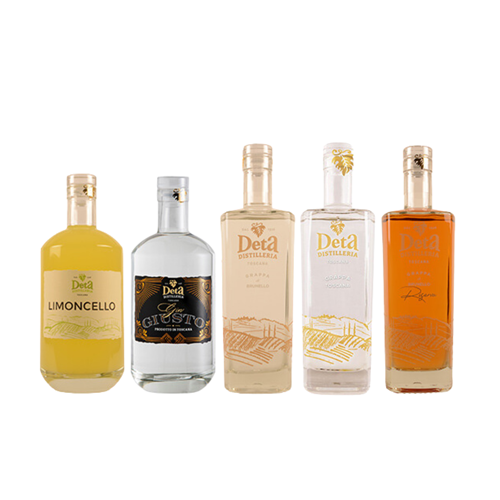

Palazzo (Italy - Tuscany)
Azienda Palazzo. This area produces wine since 1983. The families Loia and Palazzo manage 4 hectares of vineyards with another 3 hectares of olive groves on the eastern slope of Montalcino. Quality is key at Palazzo. With a small production Palazzo guarantees the best quality.







